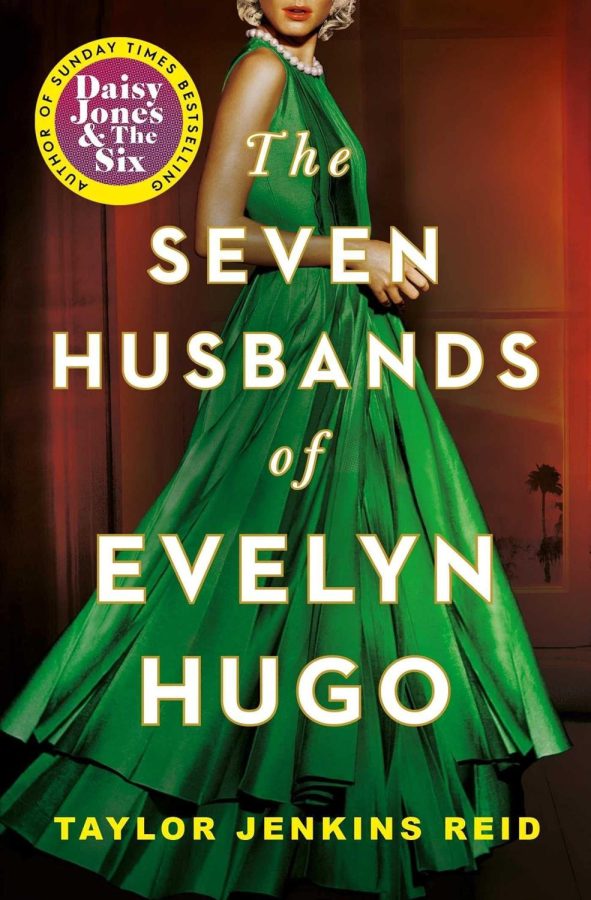“The Seven Husbands of Evelyn Hugo” a modern take on Hollywood
The Seven Husbands of Evelyn Hugo is a novel that explores the objectification of women through the experiences of a fictional Hollywood icon. Evelyn Hugo exploits her sexuality to gain fame and fortune in mid-20th century Hollywood.
In an industry completely dominated by men, Hugo manages to preserve an iconic career, through a feminine persona that exposes the expected society’s gender roles for women. Coming from an abusive father and having to stand up for herself, she realizes, by age fourteen, she can’t fight against the patriarchal society and appeals to her attractive physique to manipulate men into being her ride to freedom. This forces her marriage to her first husband Ernie Diaz.
Acknowledging the differences between the 20th-century Hollywood industry and today, while recognizing the expected role for women in society, women should not feel pressured to use their sexuality as a means of achieving success or gaining power. Regardless of this being the main character’s approach, the unethical decision she has to make, and the effect they have on her relationships, transmits the idea that judging and valuing women based on their sexual appeal should not be the default. The novel transmits such a contingent message, it touches any type of reader, making it a must-read for anyone living around women.
As a fundamental aspect of Evelyn’s character development was the 1970s Hollywood film industry conforming to strict standards of beauty and behavior. Hugo’s second husband Don Adler was the first man to treat her like a human being instead of a sex object, for the first months at least. However, he quickly began to exhibit the same patriarchal values through physical and psychological abuse. Don, out of jealousy for her newly gained success, uncovers the unspoken rules of the Hollywood business they both live in, where the couple’s perception had to illustrate a perfect fantasy, to please a society dominated by men rather than personal desires.
“My mother raised me to be polite, to be demure. I have long operated under the idea that civility is subservience. But it hasn’t gotten me very far, that type of kindness. The world respects people who think they should be running it,” page 112.
Regardless of Evelyn Hugo being a fictional actress, she portrays real-life Hollywood icons such as Marilyn Monroe known for her beauty and talent during the 1950s. Her career was also often overshadowed by the media attention paid to her tumultuous personal life, including her marriages to high-profile men.
Likewise, the book portrays sexist pressure to associate men with professional life, linking career opportunities to personal relationships. Evelyn’s third husband Mick Riva, a famous musician, and fourth husband Rex North, co-star in one of her star films, mirrors Marilyn’s relationship with Arthur Miller a screenwriter and Joe DiMaggio, a popular baseball player. While both women were incredibly talented and successful in their own right, their marriages to high-profile men did contribute to their fame and public image. Author Taylor Jenkins uses such characters to present the idea that a woman’s worth is tied to her relationship with a powerful man, maintaining an engaging narrative while criticizing society’s values.
Hugo was utilizing the standards for her own purposes, to the public eye it might appear as if she gave up on them but secretly opposed them. Evelyn takes calculated decisions using her wit, charm and knowledge to win the sympathy and support of the public, attracting influential men in the industry while hiding her true self.
For example, her decision to play the role of “damsel in distress” can be seen as a construction of the public persona she needs to maintain her career. By appearing vulnerable and dependent on the men in her life, and now with her fifth husband, Harry Cameron, she was able to deflect attention from her own desires and keep her real love for the also iconic actress, Celia St. James and their romantic relationship out of the public eye.
In a society where homosexuality was still considered taboo and unacceptable, the decision to keep her bisexuality hidden was not simply a matter of personal choice. It was a reflection of the deeply entrenched homophobia and discrimination that existed in Hollywood and society at large in the 60s. Putting her in a position where her authentic self would not have a place in society. This leads to one of the book’s most famous quotes, “…Learn how to grab life by the balls, dear. Don’t be so tied up trying to do the right thing…,” page 30.
Overall, “The Seven Husbands of Evelyn Hugo” is an insightful novel that explores the objectification of women in Hollywood and society as a whole. The story of Evelyn Hugo highlights the experiences of women who were forced to navigate patriarchal structures and societal expectations to achieve their dreams, even if it led them to make unethical decisions. Shedding light on the importance of personal choices regardless of oppressive systems, the novel ultimately serves as a reminder that we must continue to work towards a more equitable and just world, where individuals are valued for their talents and contributions rather than their appearance or gender.




